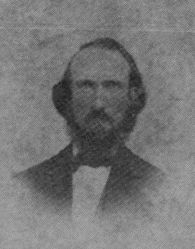As the magnitude of the Confederate losses at Gettysburg and Vicksburg sink into the public consciousness of the South, Christian Index editor and Southern Baptist journalist Samuel Boykin offers his perspective on the crisis at hand, emphatically declaring the inevitable triumph of Southern white supremacy.
[The Crisis of our National Affairs] Is undoubtedly upon us, for our enemies possess higher vantage ground than they have ever hitherto enjoyed. But thanks to a just and righteous cause, and to the inborn heroic patriotism of our people, we are rising superior to our misfortune, and from the darkness of temporary dismay will soon emerge into the glorious sunshine of confident satisfaction.
It cannot be that He who has lit up the gloom of this Revolution by such heavenly manifestation of his own special favor, is going to desert us, and permit subjugation to hatch its infernal brood of pillage, outrage, destruction and extermination! It cannot be that He who has shed down such wondrous revivals, from on high, upon our armies, is going to permit a country so signally blessed to be over-run by vandal hordes! It cannot be that the glory-blazed pathway of our young Confederacy is soon to be lost in the undistinguishable wilderness of defeat and disaster! It cannot be that the pillars of eternity, which have reverberated with the supernatural heroism of a gallant and noble people, shall have to resound with the submissive wailings of that same people, beneath the contumelious yoke of subjugation! It cannot–it must not be, that such a people as ours, entertain, even for a moment, feelings of doubt or hesitation in regard to the lofty and sublime destiny before them, and of their duty in order to achieve that destiny!
Their duty, in this moment of peril, is to rise as one man, and, with arms in their hands, interpose between their firesides and their altars, and infamy and destruction.
Theirs it is to show to the world the impossibility of conquering an Anglo-Saxon people, who would be free!
Theirs it is to raise up for the pride and delight and admiration of their children’s children, a pyramid of glory which, like those of the Nile, indestructible by the ravages of Time, shall, to all coming generations, speak of the lustrous valor, the undying patriotism and the unconquerable spirit of the people of the South.
Let there, then, be no faltering. Let each man capable of bearing arms shoulder his gun and take his place in the ranks of glory and of honor.
Not as yet have we reached that state which authorizes despondency. Our means and resources are greater now than at any previous period: the spirit of our people is more unsubdued than ever; and the number of men we have in the field–men as gallant and as full of the fires of patriotism and valor as ever walked the earth–is as great now as it ever has been since we first took up arms. In the words of a sensible contemporary–
Lee has still a large army of war-worn veterans, not a particle discouraged by their late rough usage in Pennsylvania. Richmond is yet protected by a force sufficiently large and effective for any call that may be made. Ample forces still guard the Atlantic coast, from Suffolk to Fernandina, holding the Abolition vandals at bay. Bragg has a large army, second to none upon the continent in all soldierly qualities. Joe Johnson has a considerable force, the very flower of Southern and Western chivalry; and beyond the Mississippi are gathered the stalwart warriors of the prairies and the wilds, every one of them prepared to prove himself a hero under the gallant Price, Magruder, Kirby Smith and Taylor. The casualties of battle, though severe, have scarcely reduced our effective strength within the past six months, for none of our troops are going out of service, the conscription is daily replenishing the losses by sickness and battle, and our exchange account still shows a balance in our favor. At the opening of the new year we were stronger than ever before, and we are not a particle weaker today. We have still the conscripts between forty and forty-five to call into the field, not to speak of the boys every day becoming liable to enrollment–and then we have all the able-bodied reserves, of whatever age, who can and will cheerfully take the field when their services are needed….
Boykin’s voiced confidence in an ample supply of white soldiers ignores the flight of white commoners in the decade prior to the war, a time when far more whites left the South for the North–in search of jobs–than moved from the North to the South. The number of available Southern white males is now a concern of Confederate leaders, and the situation will only grow worse.
Sources: Samuel Boykin, “The Crisis of our National Affairs,” Christian Index, July 24, 1863; see James M. McPherson, “Antebellum Southern Exceptionalism: A New Look at an Old Question”, Civil War History 29, September 1983 (link)



